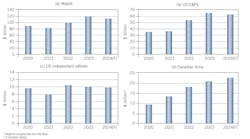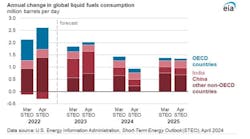In a recent filing with the US Securities and Exchange Commission, Deutsche Bank AG said it will change the composition of its $3.3 billion PowerShares DB Commodity Index Tracking Fund (DBC) to become more diversified and to comply with position limits imposed by the US Commodity Futures Trading Commission.
That includes reducing some of its previous exposure on West Texas Intermediate on the New York Mercantile Exchange and adding North Sea Brent crude on the IntercontinentalExchange Inc. to the six commodities it currently tracks. That will be its first investment in a non-US energy commodity. DBC also will add natural gas and reformulated blend stock for oxygenate blending (RBOB) while reducing its exposure to heating oil. The changes should be effective Oct. 30.
"This should translate in the liquidation of about 8,000 WTI contracts and the buying of about 6,000 Brent contracts, the liquidation of about 3,000 heating oil contracts and the buying of about 5,000 gasoline contracts," said Olivier Jakob at Petromatrix, Zug, Switzerland. He expects Deutsche Bank to effect the changes by Oct. 19 or earlier "through its trading desks." The fund currently owns November contracts for WTI and heating oil.
"These changes are provoked by the CFTC revocation (effective at the end of October) of the position exemption previously given to Deutsche. The Deutsche move to a broader composition however means that its commodity index is losing some of the traits that made it different [from] other indices as it becomes just another very broad index (up to now it was concentrated in only six commodities)," Jakob said.
He said, "We are approaching the time where more commodity indices will announce their commodity weights for 2010, and it will be interesting to see if they follow Deutsche in moving more of the crude weights towards the Brent ICE contract."
The flagship of Deutsche Banks commodity services family of funds, the DBC enters into long futures contracts and collateralizes those contracts with US 3-month Treasury bills. It provides investors with broadly diversified exposure to the returns of the commodities markets, which have historically allowed investors to diversify their stock and bond portfolios.
The CFTC earlier instructed Deutsche Bank to reduce positions in corn and wheat futures through its $2.2 billion PowerShares DB Agriculture Fund (DBA). It also revoked previous exemptions allowing the two funds to exceed position limits on agricultural products.
War with Iran?
Analysts in the Houston office of Raymond James & Associates Inc. said Oct. 5, "Based upon the recent political rhetoric, we now think the risk of an Iranian oil supply interruption is meaningfully higher than it was a few months ago. In fact, we now believe there is better than a 50% probability that some type of military confrontation with Iran will occur in the course of the next 12 months."
The analysts noted an Oct. 3 article in the New York Times citing "a leaked internal report from the International Atomic Energy Agency that says Iran has essentially worked out all of its technical issues to build a nuclear weapon." The only remaining step, it said, is enriching a sufficient quantity of weapons-grade uranium, which Western intelligence sources speculate could be just a matter of months if enrichment continues at the current pace.
The Times article said conclusions of the report by IAEA experts are tentative but go "well beyond the public positions" taken by the US and others. Earlier US President Barack Obama joined representatives from Russia, China, France, the UK, and Germany in talks with Iranian officials in Geneva, where he said: "We have made it clear that we will do our part to engage the Iranian government on the basis of mutual interests and mutual respect, but our patience is not unlimited."
Raymond James analysts said, "In the past 2 weeks, the risk of an Iranian oil supply disruption has increased sharply while the oil markets seem to have completely ignored the potential change to the global oil supply-demand equation. Normally during geopolitical crises involving the Middle East, oil prices take notice well before military action actually begins.
"This was the case, for example, in the run-up to war with Iraq in 2003. In fact, the same was true in early 2006, when Iran announced the end of its moratorium on nuclear enrichment. But here we are, in the midst of what some are calling 'a Cuban Missile Crisis in slow motion,' with the Iranian regime playing hardball and tensions palpably rising in the region and the oil market just yawns," they said.
(Online Oct. 5, 2009; author's e-mail: [email protected])
More Oil & Gas Journal Current Issue Articles
More Oil & Gas Journal Archives Issue Articles

